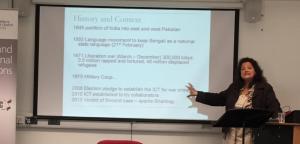A day of exciting presentations and vibrant discussion.
Canterbury Christ Church University held the first Activism Research Network workshop on 15 June 2015. The workshop was entitled ‘Political Protest in Theory and Practice’.
Through researching and engaging with activists and issues, the Activism Research Network is concerned with a number of key questions, including: ‘What makes for successful activism’? ‘How can activism both inform and transform the political agenda?’ ‘What is and ought to be the relationship between academics and activists?’ Our research seeks to inform progressive forms of political mobilisation, through the development of evidence informed toolkits, workshops and engagement with stakeholders.
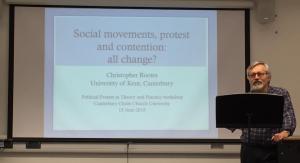 Keynote Speaker Professor Christopher Rootes (University of Kent) gave a compelling account of the current state of social movements discourse, particularly as this pertains to issues of protest and contention. The talk returned to key first principles, assessing the very academic utility of the term ‘social movement’. Do we need a new discourse to account for protest and contention in the period often referred to as ‘globalisation’? How does globalisation both facilitate and problematize political protest?
Keynote Speaker Professor Christopher Rootes (University of Kent) gave a compelling account of the current state of social movements discourse, particularly as this pertains to issues of protest and contention. The talk returned to key first principles, assessing the very academic utility of the term ‘social movement’. Do we need a new discourse to account for protest and contention in the period often referred to as ‘globalisation’? How does globalisation both facilitate and problematize political protest?
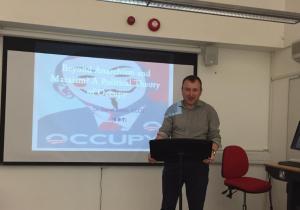
Dr David Bates (Canterbury Christ Church University) looked at how the historical debate between Marxism and anarchism has come to be reimagined through the ‘object’ of the Occupy Movement. He argued that anarchists and Marxists have both failed to appreciate the meaning and significance of the ‘moment of Occupy’; instead, in commenting on and engaging with Occupy, they have re-enacted old ideological divisions, not well aligned with the requirements of protest and contestation in the twenty first century.
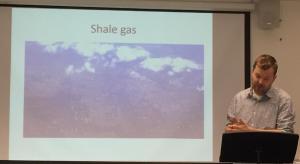
Dr Matthew Ogilvie (Canterbury Christ Church University) spoke about current debates on fracking. He explained the wider context of the fracking debate – looking at the US and UK, before assessing some of the different ways in which fracking has been framed – both in the pro-fracking and anti-fracking camps. Clearly fracking is going to be one of the key arenas of contestation and mobilisation in coming years. (For our high profile role in recent fracking debates, see: http://www.theguardian.com/uk-news/2014/dec/15/police-university-list-fracking-debate .)
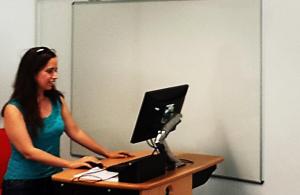
Dr Ruth Sanz-Sabido (Canterbury Christ Church University) spoke about the mobilisation of historical memory of Franco’s rule in contemporary Spain. The talk drew on ethnographic research and historical testimonies of the memory movement, in order to assess the ways in which community based practices and mobilisations keep such contested memory alive. Central to the talk was the claim that Spain has yet to come to terms with its history – specifically the violence endured under the Fascist dictatorship of General Franco. (For more details of Dr Sanz-Sabido’s work, see: http://www.canterburymediaartdesign.co.uk/memories-of-the-spanish-civil-war/ )
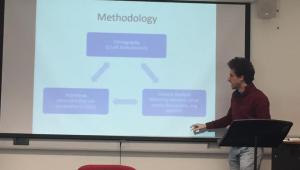
Dr Eugene Nulman (Birmingham City University) gave a fascinating talk, reporting on his current research on Left Unity. The talk provided an assessment Left Unity via a comparative critique of ‘rational choice’ and ‘habitus’ models of social explanation. Ultimately it was concluded that neither approach could account for the embedded behaviours and practices of Left Unity activists.
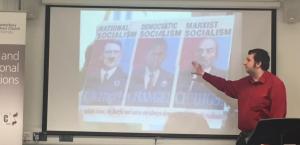
James Gates (PhD candidate, Canterbury Christ Church University) gave a fascinating and compelling presentation on the Tea Party movement in the US. The talk situated the movement in the wider context of recurrent mobilisations of American history for causes across the political spectrum. To this extent the current manifestation of the Tea Party is not unique. James’ presentation also provided an assessment of the current state of the discipline of historiography, and how this informs our understanding of movements such as the Tea Party.
Razia Shariff (PhD candidate, Canterbury Christ Church University) gave an excellent presentation on the Shahbag movement in Bangladesh. The presentation addressed some crucial questions including: to what extent is Shahbag a ‘spontaneous’ social movement? To what extent might it be regarded as a ‘progressive’ movement of social transformation? What implications does Shahbag have for our understanding of contemporary civil society mobilisations? (For further details of this research, see: https://canterburypolitics.wordpress.com/2015/03/18/peaks-tensions-and-lessons-of-the-shahbag-movement/ )
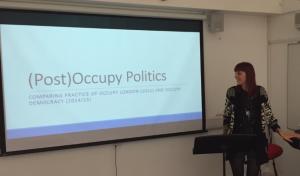
Emma Pole (PhD candidate, Canterbury Christ Church University) looked at what might be regarded as ‘post-Occupy’ politics. The presentation looked at the differing tensions (practically and theoretically) within the ‘consensus’ model of decision making, a model often deemed to be central to the very identity of Occupy. What are the historical origins of this model? How has it evolved? Is it adequate to for the requirements of contemporary forms of mobilisation?
Throughout the workshop, there were a range of insightful questions from other paper givers and participants. We are looking forward to the second workshop in this series. For more details, see:
 Politics
Politics Anna Vanaga
Anna Vanaga 420
420
